- Home
- Elizabeth Gaskell
Ruth Page 13
Ruth Read online
Page 13
He was very much excited; he was even surprised at his own excitement; but his thoughts and meditations through the long afternoon had prepared his mind for this manner of viewing the subject.
"These are quite new ideas to me," said Miss Benson, coldly. "I think you, Thurstan, are the first person I ever heard rejoicing over the birth of an illegitimate child. It appears to me, I must own, rather questionable morality."
"I do not rejoice. I have been all this afternoon mourning over the sin which has blighted this young creature; I have been dreading lest, as she recovered consciousness, there should be a return of her despair. I have been thinking of every holy word, every promise to the penitent—of the tenderness which led the Magdalen aright. I have been feeling, severely and reproachfully, the timidity which has hitherto made me blink all encounter with evils of this particular kind. Oh, Faith! once for all, do not accuse me of questionable morality, when I am trying more than ever I did in my life to act as my blessed Lord would have done."
He was very much agitated. His sister hesitated, and then she spoke more softly than before.
"But, Thurstan, everything might have been done to 'lead her right' (as you call it), without this child, this miserable offspring of sin."
"The world has, indeed, made such children miserable, innocent as they are; but I doubt if this be according to the will of God, unless it be His punishment for the parents' guilt; and even then the world's way of treatment is too apt to harden the mother's natural love into something like hatred. Shame, and the terror of friends' displeasure, turn her mad—defile her holiest instincts; and, as for the fathers—God forgive them! I cannot—at least, not just now."
Miss Benson thought on what her brother said. At length she asked, "Thurstan (remember I'm not convinced), how would you have this girl treated according to your theory?"
"It will require some time, and much Christian love, to find out the best way. I know I'm not very wise; but the way I think it would be right to act in, would be this—" He thought for some time before he spoke, and then said:
"She has incurred a responsibility—that we both acknowledge. She is about to become a mother, and have the direction and guidance of a little tender life. I fancy such a responsibility must be serious and solemn enough, without making it into a heavy and oppressive burden, so that human nature recoils from bearing it. While we do all we can to strengthen her sense of responsibility, I would likewise do all we can to make her feel that it is responsibility for what may become a blessing."
"Whether the children are legitimate or illegitimate?" asked Miss Benson, drily.
"Yes!" said her brother, firmly. "The more I think, the more I believe I am right. No one," said he, blushing faintly as he spoke, "can have a greater recoil from profligacy than I have. You yourself have not greater sorrow over this young creature's sin than I have: the difference is this, you confuse the consequences with the sin."
"I don't understand metaphysics."
"I am not aware that I am talking metaphysics. I can imagine that if the present occasion be taken rightly, and used well, all that is good in her may be raised to a height unmeasured but by God; while all that is evil and dark may, by His blessing, fade and disappear in the pure light of her child's presence. Oh, Father! listen to my prayer, that her redemption may date from this time. Help us to speak to her in the loving spirit of thy Holy Son!"
The tears were full in his eyes; he almost trembled in his earnestness. He was faint with the strong power of his own conviction, and with his inability to move his sister. But she was shaken. She sat very still for a quarter of an hour or more, while he leaned back, exhausted by his own feelings.
"The poor child!" said she, at length—"the poor, poor child! what it will have to struggle through and endure! Do you remember Thomas Wilkins, and the way he threw the registry of his birth and baptism back in your face? Why, he would not have the situation; he went to sea and was drowned, rather than present the record of his shame."
"I do remember it all. It has often haunted me. She must strengthen her child to look to God, rather than to man's opinion. It will be the discipline, the penance, she has incurred. She must teach it to be (humanly speaking) self-dependent."
"But after all," said Miss Benson (for she had known and esteemed poor Thomas Wilkins, and had mourned over his untimely death, and the recollection thereof softened her)—"after all, it might be concealed. The very child need never know its illegitimacy."
"How?" asked her brother.
"Why—we know so little about her yet; but in that letter, it said she had no friends;—now, could she not go into quite a fresh place, and be passed off as a widow?"
Ah, tempter! unconscious tempter! Here was a way of evading the trials for the poor little unborn child, of which Mr Benson had never thought. It was the decision—the pivot, on which the fate of years moved; and he turned it the wrong way. But it was not for his own sake. For himself, he was brave enough to tell the truth; for the little helpless baby, about to enter a cruel, biting world, he was tempted to evade the difficulty. He forgot what he had just said, of the discipline and penance to the mother consisting in strengthening her child to meet, trustfully and bravely, the consequences of her own weakness. He remembered more clearly the wild fierceness, the Cain-like look, of Thomas Wilkins, as the obnoxious word in the baptismal registry told him that he must go forth branded into the world, with his hand against every man's, and every man's against him.
"How could it be managed, Faith?"
"Nay, I must know much more, which she alone can tell us, before I can see how it is to be managed. It is certainly the best plan."
"Perhaps it is," said her brother, thoughtfully, but no longer clearly or decidedly; and so the conversation dropped.
Ruth moved the bed-curtain aside, in her soft manner, when Miss Benson re-entered the room; she did not speak, but she looked at her as if she wished her to come near. Miss Benson went and stood by her. Ruth took her hand in hers and kissed it; then, as if fatigued even by this slight movement, she fell asleep.
Miss Benson took up her work, and thought over her brother's speeches. She was not convinced, but she was softened and bewildered.
Chapter XII - Losing Sight of the Welsh Mountains
*
Miss Benson continued in an undecided state of mind for the two next days; but on the third, as they sat at breakfast, she began to speak to her brother.
"That young creature's name is Ruth Hilton."
"Indeed! how did you find it out?"
"From herself, of course. She is much stronger. I slept with her last night, and I was aware she was awake long before I liked to speak, but at last I began. I don't know what I said, or how it went on, but I think it was a little relief to her to tell me something about herself. She sobbed and cried herself to sleep; I think she is asleep now."
"Tell me what she said about herself."
"Oh, it was really very little; it was evidently a most painful subject. She is an orphan, without brother or sister, and with a guardian, whom, I think she said, she never saw but once. He apprenticed her (after her father's death) to a dressmaker. This Mr Bellingham got acquainted with her, and they used to meet on Sunday afternoons. One day they were late, lingering on the road, when the dressmaker came up by accident. She seems to have been very angry, and not unnaturally so. The girl took fright at her threats, and the lover persuaded her to go off with him to London, there and then. Last May, I think it was. That's all."
"Did she express any sorrow for her error?"
"No, not in words, but her voice was broken with sobs, though she tried to make it steady. After a while she began to talk about her baby, but shyly, and with much hesitation. She asked me how much I thought she could earn as a dressmaker, by working very, very hard; and that brought us round to her child. I thought of what you had said, Thurstan, and I tried to speak to her as you wished me. I am not sure if it was right; I am doubtful in my own mind still."
&nb
sp; "Don't be doubtful, Faith! Dear Faith, I thank you for your kindness."
"There is really nothing to thank me for. It is almost impossible to help being kind to her; there is something so meek and gentle about her, so patient, and so grateful!"
"What does she think of doing?"
"Poor child! she thinks of taking lodgings—very cheap ones, she says; there she means to work night and day to earn enough for her child. For, she said to me, with such pretty earnestness, 'It must never know want, whatever I do. I have deserved suffering, but it will be such a little innocent darling!' Her utmost earnings would not be more than seven or eight shillings a week, I'm afraid; and then she is so young and so pretty!"
"There is that fifty pounds Mrs Morgan brought me, and those two letters. Does she know about them yet?"
"No; I did not like to tell her till she is a little stronger. Oh, Thurstan! I wish there was not this prospect of a child. I cannot help it. I do—I could see a way in which we might help her, if it were not for that."
"How do you mean?"
"Oh, it's no use thinking of it, as it is! Or else we might have taken her home with us, and kept her till she had got a little dress-making in the congregation, but for this meddlesome child; that spoils everything. You must let me grumble to you, Thurstan. I was very good to her, and spoke as tenderly and respectfully of the little thing as if it were the Queen's, and born in lawful matrimony."
"That's right, my dear Faith! Grumble away to me, if you like. I'll forgive you, for the kind thought of taking her home with us. But do you think her situation is an insuperable objection?"
"Why, Thurstan!—it's so insuperable, it puts it quite out of the question."
"How?—that's only repeating your objection. Why is it out of the question?"
"If there had been no child coming, we might have called her by her right name—Miss Hilton; that's one thing. Then, another is, the baby in our house. Why, Sally would go distraught!"
"Never mind Sally. If she were an orphan relation of our own, left widowed," said he, pausing, as if in doubt. "You yourself suggested she should be considered as a widow, for the child's sake. I'm only taking up your ideas, dear Faith. I respect you for thinking of taking her home; it is just what we ought to do. Thank you for reminding me of my duty."
"Nay, it was only a passing thought. Think of Mr Bradshaw. Oh! I tremble at the thought of his grim displeasure."
"We must think of a higher than Mr Bradshaw. I own I should be a very coward, if he knew. He is so severe, so inflexible. But after all he sees so little of us; he never comes to tea, you know, but is always engaged when Mrs Bradshaw comes. I don't think he knows of what our household consists."
"Not know Sally? Oh yes, but he does. He asked Mrs Bradshaw one day, if she knew what wages we gave her, and said we might get a far more efficient and younger servant for the money. And, speaking about money, think what our expenses would be if we took her home for the next six months."
That consideration was a puzzling one; and both sat silent and perplexed for a time. Miss Benson was as sorrowful as her brother, for she was becoming as anxious as he was to find it possible that her plan could be carried out.
"There's the fifty pounds," said he, with a sigh of reluctance at the idea.
"Yes, there's the fifty pounds," echoed his sister, with the same sadness in her tone. "I suppose it is hers."
"I suppose it is; and being so, we must not think who gave it to her. It will defray her expenses. I am very sorry, but I think we must take it."
"It would never do to apply to him under the present circumstances," said Miss Benson, in a hesitating manner.
"No, that we won't," said her brother, decisively. "If she consents to let us take care of her, we will never let her stoop to request anything from him, even for his child. She can live on bread and water. We can all live on bread and water rather than that."
"Then I will speak to her and propose the plan. Oh, Thurstan! from a child you could persuade me to anything! I hope I am doing right. However much I oppose you at first, I am sure to yield soon; almost in proportion to my violence at first. I think I am very weak."
"No, not in this instance. We are both right: I, in the way in which the child ought to be viewed; you, dear good Faith, for thinking of taking her home with us. God bless you, dear, for it!"
When Ruth began to sit up (and the strange, new, delicious prospect of becoming a mother seemed to give her some mysterious source of strength, so that her recovery was rapid and swift from that time), Miss Benson brought her the letters and the bank-note.
"Do you recollect receiving this letter, Ruth?" asked she, with grave gentleness. Ruth changed colour, and took it and read it again without making any reply to Miss Benson. Then she sighed, and thought a while; and then took up and read the second note—the note which Mrs Bellingham had sent to Mr Benson in answer to his. After that she took up the bank-note and turned it round and round, but not as if she saw it. Miss Benson noticed that her fingers trembled sadly, and that her lips were quivering for some time before she spoke.
"If you please, Miss Benson, I should like to return this money."
"Why, my dear?"
"I have a strong feeling against taking it. While he," said she, deeply blushing, and letting her large white lids drop down and veil her eyes, "loved me, he gave me many things—my watch—oh, many things; and I took them from him gladly and thankfully because he loved me—for I would have given him anything—and I thought of them as signs of love. But this money pains my heart. He has left off loving me, and has gone away. This money seems—oh, Miss Benson—it seems as if he could comfort me, for being forsaken, by money." And at that word the tears, so long kept back and repressed, forced their way like rain.
She checked herself, however, in the violence of her emotion, for she thought of her child.
"So, will you take the trouble of sending it back to Mrs Bellingham?"
"That I will, my dear. I am glad of it, that I am! They don't deserve to have the power of giving: they don't deserve that you should take it."
Miss Benson went and enclosed it up, there and then; simply writing these words in the envelope, "From Ruth Hilton."
"And now we wash our hands of these Bellinghams," said she, triumphantly. But Ruth looked tearful and sad; not about returning the note, but from the conviction that the reason she had given for the ground of her determination was true—he no longer loved her.
To cheer her, Miss Benson began to speak of the future. Miss Benson was one of those people who, the more she spoke of a plan in its details, and the more she realised it in her own mind, the more firmly she became a partisan of the project. Thus she grew warm and happy in the idea of taking Ruth home; but Ruth remained depressed and languid under the conviction that he no longer loved her. No home, no future, but the thought of her child, could wean her from this sorrow. Miss Benson was a little piqued; and this pique showed itself afterwards in talking to her brother of the morning's proceedings in the sick-chamber.
"I admired her at the time for sending away her fifty pounds so proudly; but I think she has a cold heart: she hardly thanked me at all for my proposal of taking her home with us."
"Her thoughts are full of other things just now; and people have such different ways of showing feeling: some by silence, some by words. At any rate, it is unwise to expect gratitude."
"What do you expect—not indifference or ingratitude?"
"It is better not to expect or calculate consequences. The longer I live, the more fully I see that. Let us try simply to do right actions, without thinking of the feelings they are to call out in others. We know that no holy or self-denying effort can fall to the ground vain and useless; but the sweep of eternity is large, and God alone knows when the effect is to be produced. We are trying to do right now, and to feel right; don't let us perplex ourselves with endeavouring to map out how she should feel, or how she should show her feelings."
"That's all very fine, and I dare
say very true," said Miss Benson, a little chagrined. "But 'a bird in the hand is worth two in the bush;' and I would rather have had one good, hearty 'Thank you,' now, for all I have been planning to do for her, than the grand effects you promise me in the 'sweep of eternity.' Don't be grave and sorrowful, Thurstan, or I'll go out of the room. I can stand Sally's scoldings, but I can't bear your look of quiet depression whenever I am a little hasty or impatient. I had rather you would give me a good box on the ear."
"And I would often rather you would speak, if ever so hastily, instead of whistling. So, if I box your ears when I am vexed with you, will you promise to scold me when you are put out of the way, instead of whistling?"
"Very well! that's a bargain. You box, and I scold. But, seriously, I began to calculate our money when she so cavalierly sent off the fifty-pound note (I can't help admiring her for it), and I am very much afraid we shall not have enough to pay the doctor's bill, and take her home with us."
"She must go inside the coach whatever we do," said Mr Benson, decidedly. "Who's there? Come in! Oh! Mrs Hughes! Sit down."
"Indeed, sir, and I cannot stay; but the young lady has just made me find up her watch for her, and asked me to get it sold to pay the doctor, and the little things she has had since she came; and please, sir, indeed, I don't know where to sell it nearer than Carnarvon."
"That is good of her," said Miss Benson, her sense of justice satisfied; and, remembering the way in which Ruth had spoken of the watch, she felt what a sacrifice it must have been to resolve to part with it.
"And her goodness just helps us out of our dilemma," said her brother, who was unaware of the feelings with which Ruth regarded her watch, or, perhaps, he might have parted with his Facciolati.
Mrs Hughes patiently awaited their leisure for answering her practical question. Where could the watch be sold? Suddenly her face brightened.

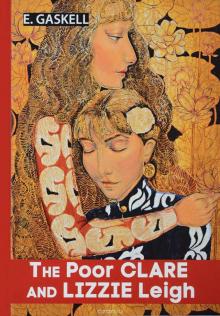 Lizzie Leigh
Lizzie Leigh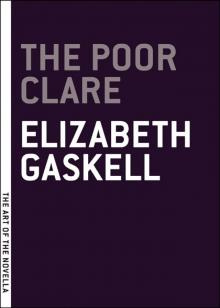 The Poor Clare
The Poor Clare Lois the Witch
Lois the Witch North and South
North and South Sexton's Hero
Sexton's Hero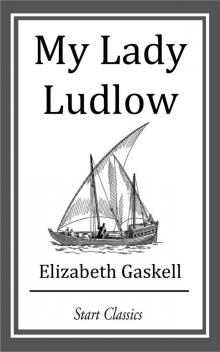 My Lady Ludlow
My Lady Ludlow Uncle Peter
Uncle Peter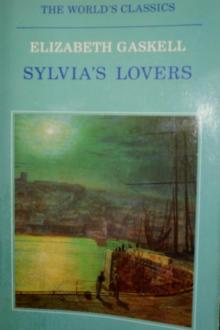 Sylvia's Lovers Elizabeth Cleghorn Gaskell
Sylvia's Lovers Elizabeth Cleghorn Gaskell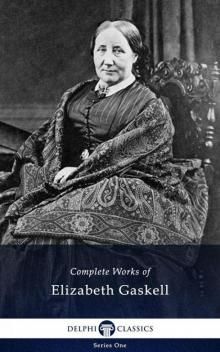 Delphi Complete Works of Elizabeth Gaskell
Delphi Complete Works of Elizabeth Gaskell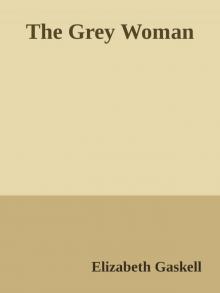 The Grey Woman
The Grey Woman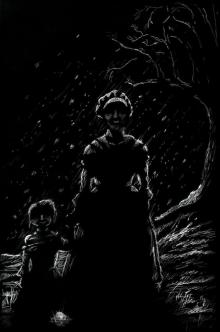 The Old Nurse's Story and Other Tales
The Old Nurse's Story and Other Tales Cranford
Cranford Gothic Tales
Gothic Tales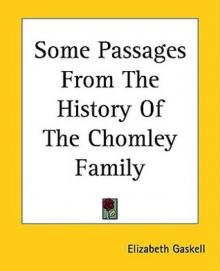 Some Passages From the History of the Chomley Family
Some Passages From the History of the Chomley Family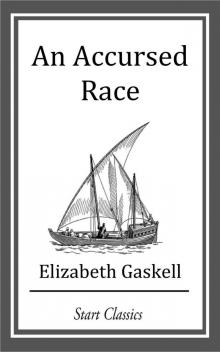 An Accursed Race
An Accursed Race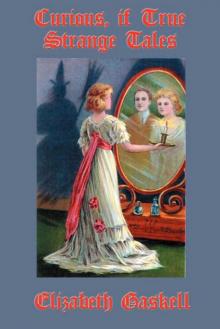 Curious, if True: Strange Tales Elizabeth Cleghorn Gaskell
Curious, if True: Strange Tales Elizabeth Cleghorn Gaskell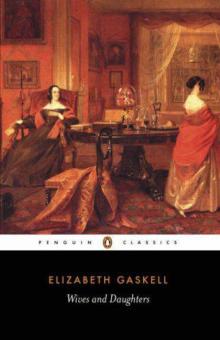 Wives and Daughters
Wives and Daughters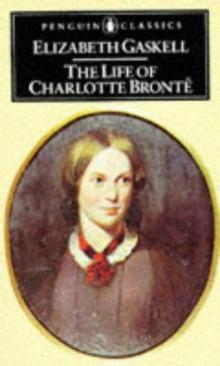 The life of Charlotte Brontë
The life of Charlotte Brontë